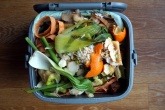Government announces £295m to help councils tackle food waste
New capital funding will support councils in England to introduce weekly food waste collections by 31 March 2026, as part of the Government’s Simpler Recycling plans.
Defra has announced that £295 million will be provided to local authorities to implement new food waste collection services, with the funds to be spent on new food waste containers for homes and specialist collection vehicles.
 This investment marks a commitment to fulfilling the Government’s policy for Simpler Recycling, which aims to deliver consistency across household and business bin collections in England and end confusion around what can and can’t be recycled in different parts of the country.
This investment marks a commitment to fulfilling the Government’s policy for Simpler Recycling, which aims to deliver consistency across household and business bin collections in England and end confusion around what can and can’t be recycled in different parts of the country.
Recycling Minister, Robbie Moore MP, commented: “Weekly food waste collections are a central plank in delivering a simpler, easier recycling system for all. It will help to stop food waste heading to landfill and support our goals of tackling both waste and climate change. We’re backing councils with new funding to ensure the nation can benefit and recycle more.”
Through its investment in weekly collections of food waste, Defra is targeting a reduction of 18 million tonnes in greenhouse gas emissions, as well as avoiding contamination of recyclable materials and preventing smelly waste from sitting in people’s bins for weeks.
The collected food waste will be sent to anaerobic digestion facilities, where it can be used to produce biogas - for renewable electricity and heating - and fertiliser.
Outlining the knock-on benefits of improved food waste collection, Claire Shrewsbury, Director of Insights and Innovations WRAP, added: “Our research shows that when food waste collections are introduced, and people see how much food goes to waste in their home, they want to do something about it.”
“And with food waste costing a household of four around £1,000 a year, weekly collections will not only help prevent food waste in the first place, but utilise the food waste collected to generate green energy and compost.”
Funding will be allocated according to a formula developed by Defra, in collaboration with WRAP and local authorities. The formula considers several variables including rurality, levels of deprivation, number of kerbside and flatted properties, configuration of flatted properties, food waste yields, vehicle and container unit costs, average collection round sizes, and existing food waste collection in each local authority.
Defra has published a list of 230 local authorities that have received grants totalling almost £230m in the 2023-24 financial year for capital equipment to provide food waste collection services. The largest of these grants was £6,877,314 awarded to Leeds City Council Metropolitan Borough Council.









